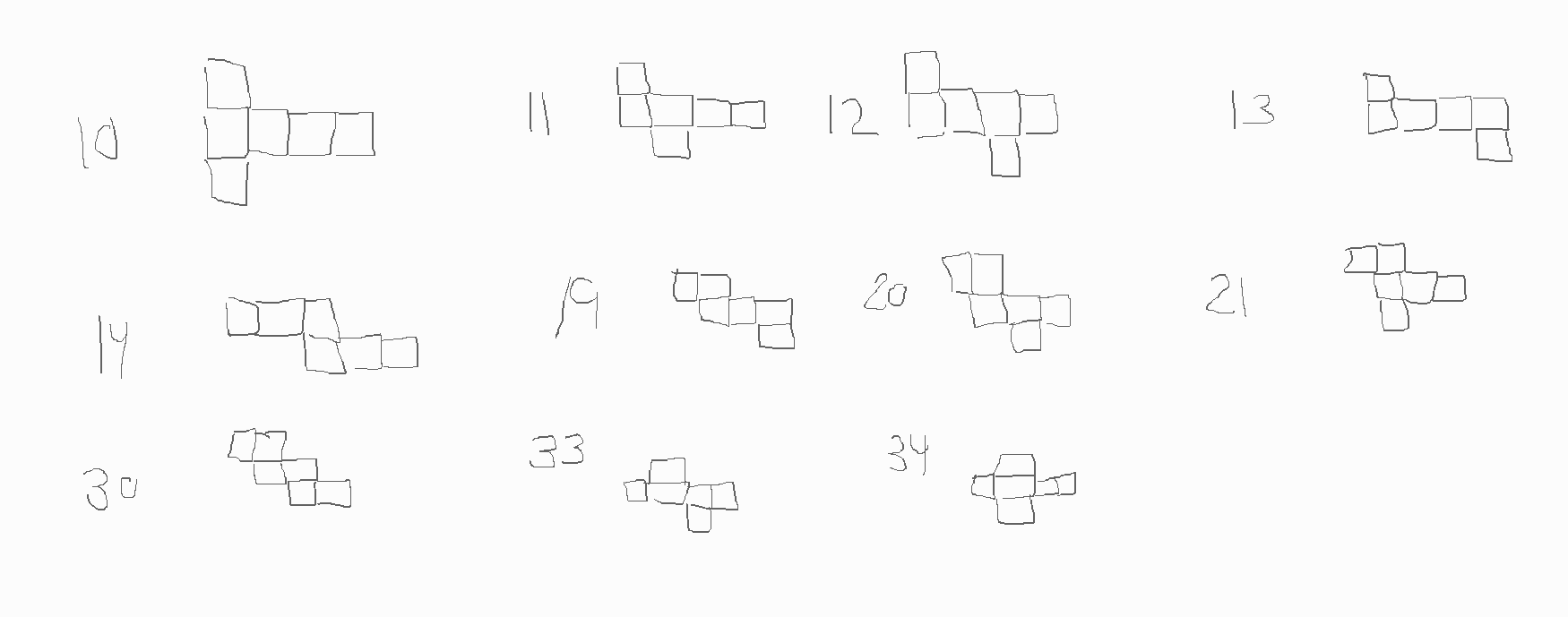Well, it’s been a bit, but I’m thinking I might have a chance at finishing 2022 off before 2023 starts…if only just! Quite a few things have changed since last time, not the least of which is this1:
chandler@boron:~$ uname -m
riscv64
I’m doing most of my non-employer-affiliated development work on a StarFive VisionFive2 these days (with a blog post likely to come at some point), and the transition to RISC-V ended up being pretty straightforward.
As always, I’ve been using Emacs and magit, but haven’t gone out of my way to
introduce any new Emacs features this time.
I finally finished this today, but today was the fifth (I believe) major attempt at cracking this particular problem. I solved the first part pretty quickly, but the second part had me stymied for quite some time. My original goal was to find a general solution for any cube net. I spent an evening with my friend Dustin trying to reason about how cube folding worked; we determined that there were eleven possible ways that a cube could unfold…and then promptly found the Wikipedia page for Nets, describing the eleven nets of a cube. Perhaps our drawing is more stylish?

But we weren’t able to figure out a good algorithm for doing so. I tried a few solutions that people had proposed in the r/adventofcode thread, but found that every solution I tried wasn’t a true solution for every case, at least as I understood it; Dustin and I always found a counterexample that broke the solution for at least one orientation of at least one net.
With that in mind, on attempt four I decided to hardcode the net to keep the
problem manageable. Despite that advantage, it still gave me some grief. I spent
several hours debugging the code, and fixed two off-by-one errors, one flipped
sign (which resulted in an edge being joined backwards, making a bit of a Möbius
cube edge), and an issue with incorrectly handling rotations when moving off the
edge of the net. Specifically, when the cursor moved off the edge, I updated the
target_pos and orientation, and if the target_pos was unobstructed, I
advanced, updating pos to target_pos. If it was obstructed, I didn’t
advance. However, I didn’t revert orientation, leading to an incorrect
orientation if I was doing all of these:
- Moving off the edge of the net to “warp” to another cube face
- Aiming for a space that was blocked
- Changing my orientation
This isn’t frequent, but it does happen, and it cost me some serious debugging time!
Anyway, the code ran a bit long, including a pretty lengthy handling of each transition on each edge of the net. Check out the sweet inline net drawings in the comments, though!
Source code
use std::fs;
#[derive(Debug, Clone, Copy, Eq, PartialEq)]
enum Square {
Void,
Wall,
Space,
}
#[derive(Debug, Eq, PartialEq)]
enum Rotation {
Clockwise,
CounterClockwise,
}
fn print_map(map: &Vec<Vec<Square>>, position: (i32, i32), orientation: (i32, i32)) {
for (i, row) in map.iter().enumerate() {
for (j, col) in row.iter().enumerate() {
if (j as i32, i as i32) == position {
match orientation {
(1, 0) => print!(">"),
(0, -1) => print!("v"),
(-1, 0) => print!("<"),
(0, 1) => print!("^"),
_ => panic!("Illegal orientation"),
}
} else {
match col {
Square::Void => print!(" "),
Square::Wall => print!("#"),
Square::Space => print!("."),
}
}
}
println!();
}
}
// Note that this puts a single row of Void around the map, so that we
// don't overflow
fn parse_map(data: &str) -> Vec<Vec<Square>> {
let rows: Vec<_> = data.split('\n').collect();
let max_width = rows.iter().map(|r| r.len()).max().unwrap(); // The first row won't necessarily be full-width, so find one that is
let mut map = vec![vec![Square::Void; max_width + 2]; rows.len() + 2];
for (i, row) in rows.iter().enumerate() {
for (j, c) in row.chars().enumerate() {
match c {
' ' => (),
'.' => map[i + 1][j + 1] = Square::Space, // This AoC brought to you by Squarespace. With Squarespace's easy-to-use dra
'#' => map[i + 1][j + 1] = Square::Wall,
_ => panic!("Unexpected map char {}", c),
}
}
}
map
}
fn parse_directions(data: &str) -> Vec<(usize, Option<Rotation>)> {
let mut directions = Vec::new();
for l_chunk in data.split('L') {
let r_chunks: Vec<_> = l_chunk.split('R').collect();
for r_chunk in &r_chunks[..r_chunks.len() - 1] {
directions.push((r_chunk.parse().unwrap(), Some(Rotation::Clockwise)));
}
directions.push((
r_chunks[r_chunks.len() - 1].parse().unwrap(),
Some(Rotation::CounterClockwise),
));
}
let last_index = directions.len() - 1; // You'd think the borrow checker could figure this out, but it specifically asks me to do this
directions[last_index].1 = None; // Last one doesn't have an associated rotation
directions
}
fn process(data: &str, cube: bool) -> usize {
let (map, directions) = data.split_once("\n\n").unwrap();
let map = parse_map(map);
let directions = parse_directions(directions);
let mut pos = (
map[1].iter().position(|x| *x == Square::Space).unwrap() as i32,
1,
);
let mut orientation = (1, 0); // facing right
for (distance, rotation) in directions {
for _ in 0..distance {
// We can do this because the map has a one-cell buffer on
// each edge, so we won't have any out-of-bounds-ness here.
let mut target_pos = (pos.0 + orientation.0, pos.1 - orientation.1);
let mut target_orientation = orientation.clone();
if map[target_pos.1 as usize][target_pos.0 as usize] == Square::Void {
if cube {
// Unfortunately, I haven't managed to find a way
// to generalize this problem, so we're going to
// end up hardcoding a bunch of things
// here. Beyond just being a bit ugly and
// non-generalizable, this also means my test case
// won't work, since that uses a different cube
// net.
//
// That said, here's some more neat looking cube
// nets I drew!
// ┌─1─┐
// 3 2
// ┌─3─┼───┼─2─┬─1─┐
// 4 │ │ │ 4
// └─5─┼───┼─7─┴─6─┘
// 5 7
// └─6─┘
// ┌───┬───┬───┐
// │ │ │ │
// └───┴───┼───┼───┬───┐
// │ │ │ │
// └───┴───┴───┘
//
// All the numbers are slightly different than
// they'd otherwise be since I have an extra
// padding square surrounding the board.
//
// Here's the shape we'll be using, with connected
// sides labeled:
// ┌─1─┬─2─┐
// 6 │ 3
// ├───┼─4─┘
// 7 4
// ┌─7─┼───┤
// 6 │ 3
// ├───┼─5─┘
// 1 5
// └─2─┘
//
match target_pos {
// side labeled 1
(x, 0) if x > 50 && x <= 100 => {
target_pos = (1, x + 100);
target_orientation = (1, 0);
}
(0, y) if y > 150 && y <= 200 => {
target_pos = (y - 100, 1);
target_orientation = (0, -1);
}
// 2
(x, 0) if x > 100 && x <= 150 => {
target_pos = (x - 100, 200);
// orientation unchanged
}
(x, 201) if x > 0 && x <= 50 => {
target_pos = (x + 100, 1);
// orientation unchanged
}
// 3
(151, y) if y > 0 && y <= 50 => {
target_pos = (100, 151 - y);
target_orientation = (-1, 0);
}
(101, y) if y > 100 && y <= 150 => {
target_pos = (150, 151 - y);
target_orientation = (-1, 0);
}
// 4
(x, 51) if x > 100 && x <= 150 => {
target_pos = (100, x - 50);
target_orientation = (-1, 0);
}
(101, y) if y > 50 && y <= 100 => {
target_pos = (y + 50, 50);
target_orientation = (0, 1);
}
// 5
(x, 151) if x > 50 && x <= 100 => {
target_pos = (50, 100 + x);
target_orientation = (-1, 0);
}
(51, y) if y > 150 && y <= 200 => {
target_pos = (y - 100, 150);
target_orientation = (0, 1);
}
// 6
(0, y) if y > 100 && y <= 150 => {
target_pos = (51, 151 - y);
target_orientation = (1, 0);
}
(50, y) if y > 0 && y <= 50 => {
target_pos = (1, 151 - y);
target_orientation = (1, 0);
}
// 7
(x, 100) if x > 0 && x <= 50 => {
target_pos = (51, x + 50);
target_orientation = (1, 0);
}
(50, y) if y > 50 && y <= 100 => {
target_pos = (y - 50, 101);
target_orientation = (0, -1);
}
_ => panic!("I haven't handled this case: {:?}", target_pos),
}
} else {
loop {
let next_target_pos =_pos.0 - orientation.0, target_pos.1 + orientation.1);
if map[next_target_pos.1 as usize][next_target_pos.0 as usize] == Square::Void {
break;
}
target_pos = next_target_pos;
}
}
}
match map[target_pos.1 as usize][target_pos.0 as usize] {
Square::Wall => (),
Square::Space => {
pos = target_pos;
orientation = target_orientation;
}
Square::Void => panic!("Square is still Void; we just fixed this!"),
}
}
orientation = match rotation {
None => orientation, // Ignore the last step
Some(Rotation::Clockwise) => (orientation.1, -orientation.0),
Some(Rotation::CounterClockwise) => (-orientation.1, orientation.0),
};
}
let orientation_val = match orientation {
(1, 0) => 0,
(0, -1) => 1,
(-1, 0) => 2,
(0, 1) => 3,
_ => panic!("Illegal orientation"),
};
(pos.1 * 1000 + pos.0 * 4 + orientation_val) as usize
}
fn main() {
let data = fs::read_to_string("input.txt").unwrap();
let data = data.trim_end(); // There's some intentional whitespace at the beginning
println!("{}", process(data, true));
}
#[cfg(test)]
mod test {
use super::*;
const DATA: &str = " ...#
.#..
#...
....
...#.......#
........#...
..#....#....
..........#.
...#....
.....#..
.#......
......#.
10R5L5R10L4R5L5";
#[test]
fn test_parse_directions() {
assert_eq!(
parse_directions("10R5L5R10L4R5L5"),
vec![
(10, Some(Rotation::Clockwise)),
(5, Some(Rotation::CounterClockwise)),
(5, Some(Rotation::Clockwise)),
(10, Some(Rotation::CounterClockwise)),
(4, Some(Rotation::Clockwise)),
(5, Some(Rotation::CounterClockwise)),
(5, None),
]
);
}
#[test]
fn test_part1() {
assert_eq!(process(DATA, false), 6032);
}
#[test]
fn test_part2() {
assert_eq!(process(DATA, true), 5031);
}
}
Soundtrack
I found Mountain Stage listening to KUMD (now 103.3 The North) in Duluth. This episode aired a few weeks ago.
This episode was recorded on May 7th, 2023 at Peoples Bank Theatre in Marietta, Ohio. The lineup includes Amy Ray Band, The Lone Bellow, Alison Brown, Tony Furtado, and Villages.
Listen to the episode on their podcasts page, or download the episode as a 128kbps MP3!
-
I was (roughly) today years old when I learned Gnome terminal has had a copy-to-html feature for years, and it works really nicely. (I simplified the output a bit, but the default would have been plenty workable.) ↩︎

